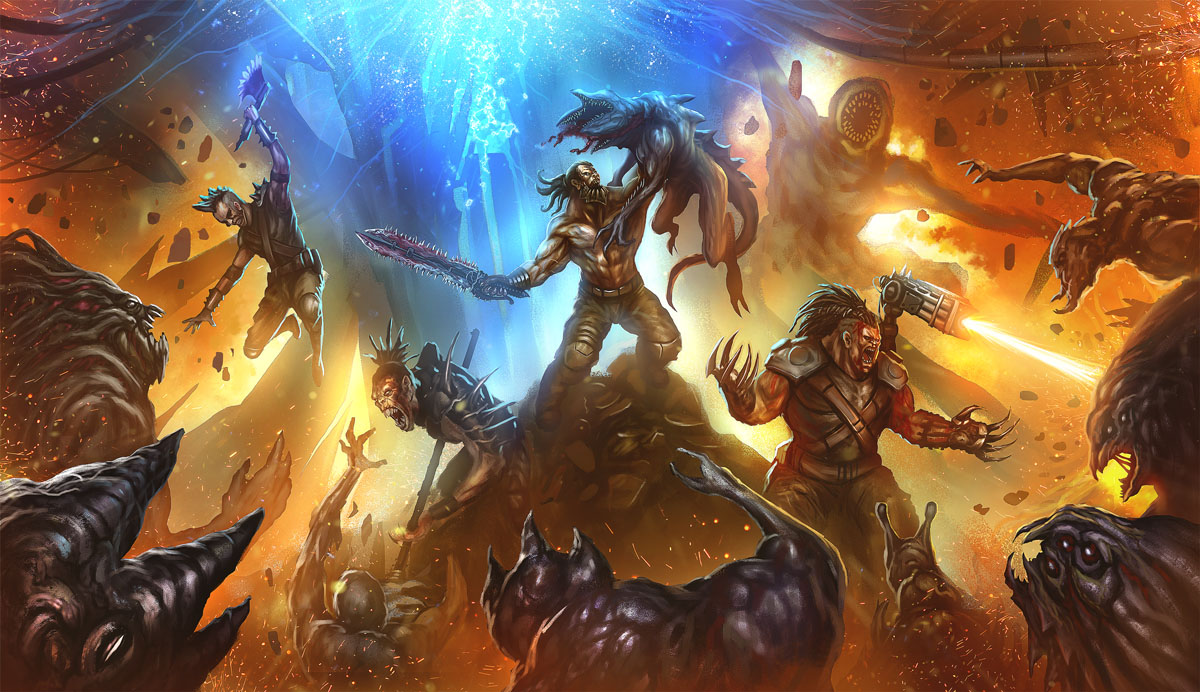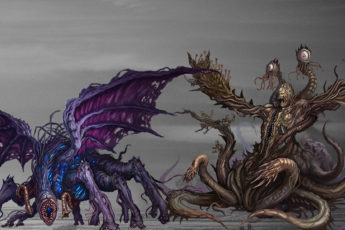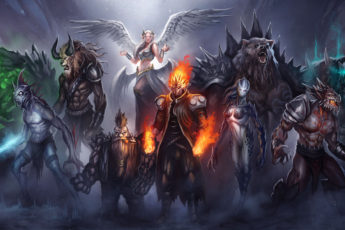10 Game Mechanics that Make After Stand Out.
- A world waiting to be discovered where 60 miles of travel presents the opportunity for a completely different culture to be discovered.
- The world’s civilizations have long been decimated, and the populations are once again so sparse that beyond any natural boundary the unknown awaits. In After we outline a few of the cultures that exist but have wiped the slate clean with the idea that the world has been brought back to a state where 6,000 people make a large city and the rest of civilization has been swallowed by the shifted landscape and wild beasts waiting to be rediscovered. This grants a group of players unlimited options of environments they would like to explore while providing a few core mechanics that apply to the world just enough to tie the stories together. This will be more apparent in our premiere GM’s Guide that will be released with our Kickstarter.
- New unique creatures with mysterious intentions.
- The beast swarms have subsided but the Kord’emuri and Dra’ken have not left. They still congregate and occasionally lay waste to settlements in mass. Also, they are not the only creatures that are new and strange to understand. There are those creatures which were created before the swarms covered the world, but no one remembers how or why they were created. Consequently, with the absence of civilization to force a measure of control and the unsteady mutations let loose on the world, natural selection went wild over the centuries.
- Character creation from concept-to-completion without wasted “re-rolls” to get there.
- In After the diversity of your characters are limitless when using the Genesis System, and you eliminate the waste of time that is the “hopeless character.” With this system you build your character concept by first choosing your class then deciding on a race or using the Mutation System to make your character appearance anyway you wish. You may even provide them with special abilities to fit your character concept. With the Genesis Points remaining you choose backgrounds, proficiencies, and finally modify their ability statistics. Character creation is simple and direct. No-fuss character-building can make your “Game Zero” last less than 30 minutes.
- Easily create thousands of unique characters with mutations or select a race template.
- When it comes to PCs or NPCs, there is no limit to what characters might look like beyond any limits placed by the GM or agreed to in the group. It is a smooth process to create uniquely playable characters with the Mutations Option in the Genesis System, but if you just want to play something other than human then quickly selecting a race template will get you rolling dice even faster.
- Intuitive magic system where players design their spells instead of memorizing lists.
- In this Roleplaying system a player does not need to memorize a list of spells or the minute details that are listed in a spell’s description. Instead the player is free to use their imagination and refer to their inspiration from media to imagine the magical effect they wish to create and describe it in-game. With the help of After’s Magic System guidelines, the GM decides the outcome of such a manifestation, and in this way a spell list will be created in-game uniquely created by the player for their character.
- Fluctuating magic where a GM sets the power level of magic to suit their story.
- Magic in After is anything except consistent. This leaves much of the control in the GM’s hands while leaving the rest to fate in the roll of dice. Since magic ebbs and flows, the GM may set his story in an area where magic is difficult to manifest or conversely is as simple as breathing. There are consequences for failing magic, but there are also ways to improve the odds. The choice of caution or recklessness lies with the caster.
- Magic is a skill and not limited by class.
- If you are looking to add a special ability or affinity for something unexplainable to your character, there are a couple of ways to do that. You might simply add a mutation ability through the Genesis System, but you also have the option to grant your character the ability to manifest the arcane. Of course, a class that focuses on this ability will have more skill at it, but it may always come in handy to be able to break the laws of reality in creative ways. Whatever you choose, remember failing to manifest your arcane vision may spell disaster.
- Smooth integration of technology with archaic weaponry.
- This was one of the biggest challenges to tackle when implementing a 5e-based system that involves magic, primitive weapons, and advanced technology. After takes an action movie approach to this by scaling damage based on the precision of the attack roll and providing bonuses to this roll based on the technology level. In this way a skilled user of an archaic weapon may face off against a competent user of advanced equipment.
- Story-based character leveling system avoids experience mining.
- Leveling a character is based on meeting a preset amount of physical and mental challenges and is only possible at the end of a session or story at the GM’s discretion. This accelerates leveling at early levels to allow players to enjoy progressing their characters abilities in today’s environment of limited playtime while also limiting the temptation to disrupt the story with meta-gaming.
- Simple barter system, reducing inventory overload.
- The value of your character’s possessions is relative to need, usefulness, and perceived value to someone else. Without banks and government to provide a monetary system, trade of goods and services is the only commodity, but to keep it simple the value of items is measured in Trade Units(TU), and the goods you carry that are most often traded are Common Pieces(CP@1TU), Special Pieces(SP@10TU), and General Tech Pieces(GTP@100TU). Scavenging is a fun challenge in and of itself utilizing intelligence to perceive the value of something and know how to recover it from the often dangerous environment.





